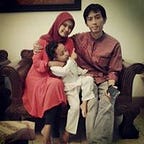Pragmatic Thinking Learning-Journey From Novice To Expert
Table of Contents
About The Book
About The Page
The Summary
— Story
— Novice vs Experts
The Value
The MindMap
— Story
— Novice vs Experts
Outro
About The Book
I’ve written the introduction about this book and it’s ToC:
About The Page
This story will tell us the summary of the second part of this book, which is: Journey From Novice To Expert
Because this page will contain too many topics to put in a single story, I’ll break it into multiple series:
Part 1: (this story)
— A Story
— Novice vs ExpertsPart 2:
— The Five Dreyfus Model StagesPart 3:
— Dreyfus At Work: Herding Racehorses And Racing SheepPart 4:
— Using The Dreyfus Model EffectivelyPart 5:
— Beware The Tool TrapPart 6:
— Consider The Context, AgainPart 7:
— Day to Day Dreyfus
— Next Actions
The Summary
We can’t solve problems by using the same kind of thinking we used when we created them
— Albert Einstein
Story
Once upon a time, two researchers (brothers) wanted to advance the state of the art in artificial intelligence. They wanted to write software that would learn and attain skills in the same manner that humans learn and gain skill (or prove that it couldn’t be done). To do that, they first had to study how humans learn.
They developed the Dreyfus Model of skill acquisition, which outlines five discrete stages through which one must pass on the journey from novice to expert.
The Dreyfus Model is what’s called a construct theory. There are two types of theories: event theories and construct theories. Both are used to explain some phenomenon that you’ve observed.
Event theories can be measured; these types of theories can be verified and proven. You can judge the accuracy of an event theory.
Construct theory are intangible abstractions; it makes no sense to speak of “proving them”. Instead, construct theories are evaluated in terms of their usefulness. You can’t judge to be accurate or not. That’s mixing apples and existentialism. An apple is a thing; existentialism is an abstraction.
For instance, I can prove all sorts of things about your brain using simple electricity or complex medical imaging devices. But I can’t even prove you have mind. Mind is an abstraction; theres really no such thing. It just an idea, a concept. But it’s very useful one
The Dreyfus Model is a construct theory. It’s an abstraction, and as we’ll see, it’s very useful one
Back in the early 1980s, the nursing profession in the United States used the lessons of the Dreyfus Model to correct their approach and help advance their profession.
Some observations:
- Expert staff members working in the trenches aren’t always recognized as expert or paid accordingly
- Not all expert staff want to end up as managers
- There’s huge variance in staff member’s abilities
- There’s huge variance in manager’s abilities
- Any given team likely has members at widely different skill levels and can’t be treated as a homogeneous set of replaceable resources
The Dreyfus model describes how and why our abilities, attitudes, capabilities, and perspectives change according to skill level
Novice vs Experts
What do you call an expert software developer? A wizard. We work with magic numbers, things in hex, zombie processes, and mystical incantations.
It’s often difficult for experts to explain their actions to a fine level of detail; many of their responses are so well practiced that they become pre-conscious actions.
It’s hard to articulate expertise
A novice cook, on the other hand, coming home after a long day at the office is probably not even interested in the subtle nuances of humidity and parsnips.
- The novice wants to know exactly how much saffron to put in the recipe
- The novice wants to know exactly how long to set the timer on the oven
- That novice need clear, context-free rules by which they can operate, just as the expert would be rendered ineffective if he were constrained to operate under those same rules
The Value
Reading this book, especially for this part, you’ll learn about
- Dreyfus model
- Novice vs experts
These two things will be useful for us to
- Examine ourselves and ask “Do we really deserve to be at the current level?” or “What level are we right now?”
- Learn the differences between novice and experts, because after reading this book, I just amaze and also blow my mind that actually sometimes we just confused between novice and experts
The MindMap
A Story
Novice vs Experts
Outro
By reading this part, specifically for A Story and the explanation about Novice vs Experts we will get so much new knowledge (at least for me), about the behaviors for a novice and also for an expert.
We will also learn about the Dreyfus Model, and I think it’s quite interesting.
